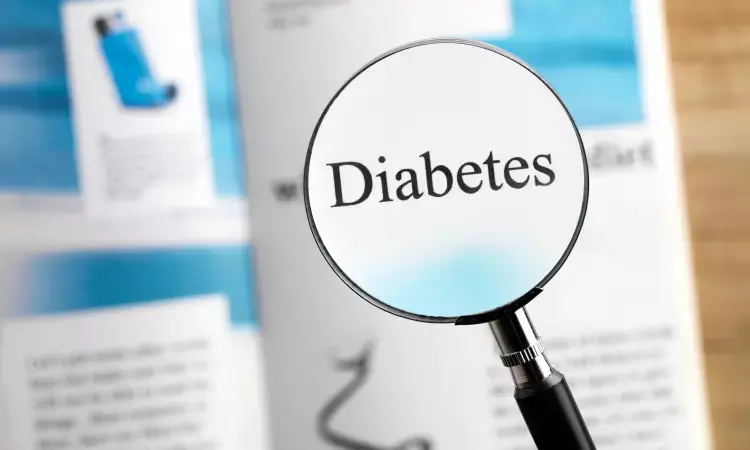- Home
- Medical news & Guidelines
- Anesthesiology
- Cardiology and CTVS
- Critical Care
- Dentistry
- Dermatology
- Diabetes and Endocrinology
- ENT
- Gastroenterology
- Medicine
- Nephrology
- Neurology
- Obstretics-Gynaecology
- Oncology
- Ophthalmology
- Orthopaedics
- Pediatrics-Neonatology
- Psychiatry
- Pulmonology
- Radiology
- Surgery
- Urology
- Laboratory Medicine
- Diet
- Nursing
- Paramedical
- Physiotherapy
- Health news
- Fact Check
- Bone Health Fact Check
- Brain Health Fact Check
- Cancer Related Fact Check
- Child Care Fact Check
- Dental and oral health fact check
- Diabetes and metabolic health fact check
- Diet and Nutrition Fact Check
- Eye and ENT Care Fact Check
- Fitness fact check
- Gut health fact check
- Heart health fact check
- Kidney health fact check
- Medical education fact check
- Men's health fact check
- Respiratory fact check
- Skin and hair care fact check
- Vaccine and Immunization fact check
- Women's health fact check
- AYUSH
- State News
- Andaman and Nicobar Islands
- Andhra Pradesh
- Arunachal Pradesh
- Assam
- Bihar
- Chandigarh
- Chattisgarh
- Dadra and Nagar Haveli
- Daman and Diu
- Delhi
- Goa
- Gujarat
- Haryana
- Himachal Pradesh
- Jammu & Kashmir
- Jharkhand
- Karnataka
- Kerala
- Ladakh
- Lakshadweep
- Madhya Pradesh
- Maharashtra
- Manipur
- Meghalaya
- Mizoram
- Nagaland
- Odisha
- Puducherry
- Punjab
- Rajasthan
- Sikkim
- Tamil Nadu
- Telangana
- Tripura
- Uttar Pradesh
- Uttrakhand
- West Bengal
- Medical Education
- Industry
New prediction model may help predict short-term renal prognosis of diabetes patients with AKI

China: According to a study published in Diabetology and Metabolic Syndrome, a nomogram could be used to establish a prediction model which helps predict the short-term renal prognosis of diabetic patients with Acute Kidney Injury (AKI). The researchers added that this model has good discrimination, calibration and reasonable clinical practicability.
One of the significant causes of the progression of Acute Kidney Injury (AKI) is diabetes. In order to predict the renal prognosis, researchers have developed a few prediction models.
Dr Manqui Mo and colleagues did a study for developing and validating a predictive model for identifying high-risk individuals with non-recovery of renal function at 90 days.
The study summary is as follows:
- The relevant data from the First Affiliated Hospital of Guangxi Medical University (January 31, 2012- January 31, 2022) were analysed.
- After AKI diagnosis, patients were followed up to 90 days.
- Logistic regression results form the basis for developing an internally validated model.
- To evaluate differentiation, accuracy and utility (clinically), the Consistency index, calibration curve, and decision curve analysis were used in the study.
- Nine hundred sixteen diabetic patients with a history of AKI were enrolled in the study.
- The non-recovery rate of renal function was 66.8% at 90 days.
- In the development cohort (641), a prediction model was developed, including variables like diabetes duration (OR, 1.022), hypertension (OR,1.574), chronic kidney disease (OR, 2.241), platelet (OR, 0.997), 25-hydroxyvitamin D3 (OR, 0.966), postprandial blood glucose (OR = 1.104), discharged serum creatinine (OR = 1.003)
- The C-indices in the developmental and validation cohorts were 0.807 and 0.803, respectively.
- The calibration curves were close to the straight line (slope 1).
- A wide range of threshold probabilities was shown with decision curve analysis.
To conclude, A prediction model could be used in diabetes patients with AKI to predict short-term renal prognosis verified to have good differentiation, calibration degree and clinical practicability. The variables used in the prediction model are duration of diabetes, hypertension history, CKD, decrease of PLT, 25(OH)D3, PBG increase and discharged Scr.
Further reading:
Mo, M et al. Development and validation of short-term renal prognosis prediction model in diabetic patients with acute kidney injury. Diabetol Metab Syndr 14, 197 (2022). https://doi.org/10.1186/s13098-022-00971-1
BDS, MDS in Periodontics and Implantology
Dr. Aditi Yadav is a BDS, MDS in Periodontics and Implantology. She has a clinical experience of 5 years as a laser dental surgeon. She also has a Diploma in clinical research and pharmacovigilance and is a Certified data scientist. She is currently working as a content developer in e-health services. Dr. Yadav has a keen interest in Medical Journalism and is actively involved in Medical Research writing.
Dr Kamal Kant Kohli-MBBS, DTCD- a chest specialist with more than 30 years of practice and a flair for writing clinical articles, Dr Kamal Kant Kohli joined Medical Dialogues as a Chief Editor of Medical News. Besides writing articles, as an editor, he proofreads and verifies all the medical content published on Medical Dialogues including those coming from journals, studies,medical conferences,guidelines etc. Email: drkohli@medicaldialogues.in. Contact no. 011-43720751


